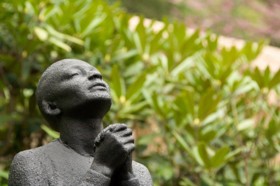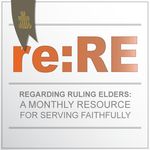A common religious conceit is that people only turn to prayer in times of difficulty and despair. In my time as a hospice chaplain, I have found that idea to be untrue. Often pain and grief seem to stifle one’s ability to connect with God in prayer. Prayer can seem both insufficient and overwhelming when trauma has pierced the soul. I am often called in to assist people in these times of spiritual disconnect.
As a new chaplain, I was daunted by the request to pray at the hospice bedside. I was afraid that my feeble attempts at prayer would not rise to the occasion and properly honor the life-changing circumstances. While I grew up in a nondenominational tradition that valued spontaneous and fervent prayer, my PC(USA) seminary experiences privileged a more scripted and measured approach to prayer. Most of the prayers I saw delivered in chapel services and convocations were beautifully prepared; carefully written out prior to the occasion. My prayers at the bedside did not sound like the well-crafted ones of my professors and colleagues. I couldn’t recall the structure and poetic movements of the prayers and liturgies I learned in my courses. I only knew how to request God’s wisdom and grace in these heartbreaking situations. As I continued in my chaplain role, I began to understand that my prayers did not need to beautiful. In fact, I realized that it was dangerous and hypocritical to think in those terms. Those prayers were not about me at all. Our prayers are about God and God’s work in the world; work that often happens through our connection with one another.

Prayer —Via Tsunji, Flickr, Creative Commons
But it was not until I had my own health crisis that I understood the true power of these bedside, unscripted prayers. As I lay in my own hospital bed, I couldn't gather my own thoughts enough to pray for myself. My own fears and anxieties rendered me unable to articulate my prayers to God. My soul thirsted for God, but I had lost trust in my own ability to cry out. And then one of the members from my congregation came to visit. Armed with anointing oil, she held her steady hand on my head, anointed my head, and then prayed for me. I don't remember the words she prayed, but I remember her words opened up sacred space for me. Her prayer helped give me the language to reconnect to God in an intimate way. The silent prayers of those in my faith community were essential to my physical recovery, yet it was her spoken prayer, while holding my hand, that sparked a spiritual recovery.
As a ruling elder, our ordination vows commit us to prayer for one another. The relatively recent change in the ordination vows explicitly asks, “Will you pray for and seek to serve the people with energy, intelligence, imagination, and love?” [PC(USA) Book of Order, W-4.4003h] This is a call to prayer and also an invitation to move from a sincere, but vague “You are in our prayers” to a more active posture of “Would you like for me to pray with you right now?” This can cause a powerful denominational culture shift. We can move our collective prayers from worship services and church meetings into our intimate spaces. Our homes, hospital rooms, and telephone lines become holy spaces when we come together and pray. As we pray with another, remember that our prayer is not performance, but it is connection. It is a humbling, but ultimately freeing opportunity to connect with God and one another with our hearts and deeds.
Zeena Regis is a ruling elder and member of Oakhurst Presbyterian Church in Decatur, Georgia. She is a graduate of Columbia Theological Seminary and currently serves as a chaplain with Hospice Atlanta/Visiting Nurse Health System. She lives in Atlanta, Georgia, with her spouse, Rahjahn, and two pups, Bella and Chip.
For more about the information provided here, please contact Martha Miller at martha.miller@pcusa.org and browse the Ruling Elders website.

